-
ORIGINAL ARTICLE10-18-2022
Humanized childbirth: the values of health professionals in daily obstetric care
Revista Brasileira de Enfermagem. 2022;75(2):e20210052
Abstract
ORIGINAL ARTICLEHumanized childbirth: the values of health professionals in daily obstetric care
Revista Brasileira de Enfermagem. 2022;75(2):e20210052
DOI 10.1590/0034-7167-2021-0052
Views0See moreABSTRACT
Objective:
To understand health professionals’ values in the process of thinking and feeling about obstetric care, based on their experienced needs in the care process.
Methods:
Phenomenological study based on the Schelerian framework, with 48 health professionals from four maternity hospitals within the Metropolitan Region II of the state of Rio de Janeiro. Data collection was done through a phenomenological interview; and the analysis, with the Ricoeurian methodological framework.
Results:
The vital value was signified in care centered on physiological processes, for an individualized and safe monitoring. The ethical value was signified in the attitudes that provide women with autonomy in their way of giving birth, and recognize dialogue as a process of sympathy, affection, and bonding.
Conclusion:
The resignification of obstetric practice, articulated with public policies in the field of delivery and birth, supported by a vital ethical value, positively contributes to the humanization of care for women.
-
ORIGINAL ARTICLE10-18-2022
Methods for measuring venous peripherally inserted central catheters in newborns
Revista Brasileira de Enfermagem. 2022;75(2):e20210045
Abstract
ORIGINAL ARTICLEMethods for measuring venous peripherally inserted central catheters in newborns
Revista Brasileira de Enfermagem. 2022;75(2):e20210045
DOI 10.1590/0034-7167-2021-0045
Views0See moreABSTRACT
Objective:
to analyze the results of insertion procedures of Peripherally Inserted Central Catheters in newborns using two measurement methods.
Methods:
this is a randomized clinical trial, presenting descriptive and exploratory results of variables. It was held at a Neonatal Intensive Care Unit. Data were collected between September 2018 and 2019. The sample analyzed was 88 catheter insertion procedures, distributed in two groups. Study approved by an Institutional Review Board and obtained registration in the country and abroad. Descriptive analysis and logistic regression of data.
Results:
modified measurement obtained a significant difference for the central catheter tip location. Elective removals and adverse events were not significant between groups; however, poor positioning was related to adverse events.
Conclusions:
between the two methods analyzed, the modified measurement obtained better results in the proper catheter tip positioning and, consequently, less risk to patients.
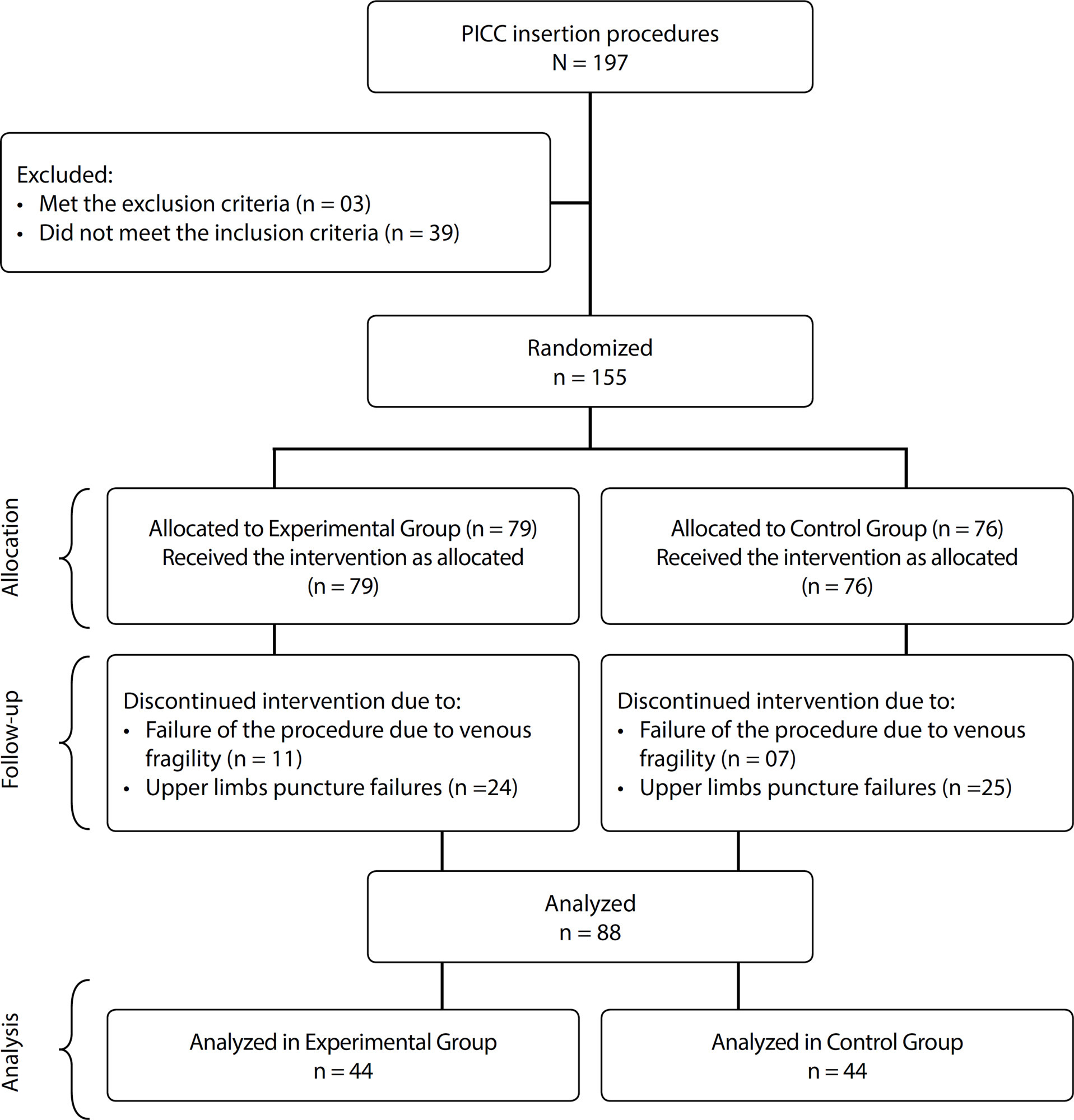
-
ORIGINAL ARTICLE10-18-2022
Clinical simulation as a Nursing Fundamentals teaching method: a quasi-experimental study
Revista Brasileira de Enfermagem. 2022;75(2):e20201155
Abstract
ORIGINAL ARTICLEClinical simulation as a Nursing Fundamentals teaching method: a quasi-experimental study
Revista Brasileira de Enfermagem. 2022;75(2):e20201155
DOI 10.1590/0034-7167-2020-1155
Views0See moreABSTRACT
Objectives:
to evaluate students’ knowledge gain after the implementation of clinical simulation in Nursing Fundamentals disciplines.
Methods:
a quasi-experimental intervention was carried out with 60 students, distributed in comparison and intervention groups, who underwent traditional teaching and traditional teaching associated with simulated teaching, respectively. Pre-test and post-test instruments were applied to both groups.
Results:
after analyzing the students’ performance through the applied instruments, both groups had a cognitive evolution along with the taught content, however, when compared, the intervention group obtained a higher knowledge gain than the comparison group (p = 0.016), demonstrating progressive and increasing improvement with the use of the methodology.
Conclusions:
simulated teaching significantly helps students in gaining technical-cognitive knowledge. Therefore, it is recommended to adhere to the use of this methodology for teaching Nursing Fundamentals.
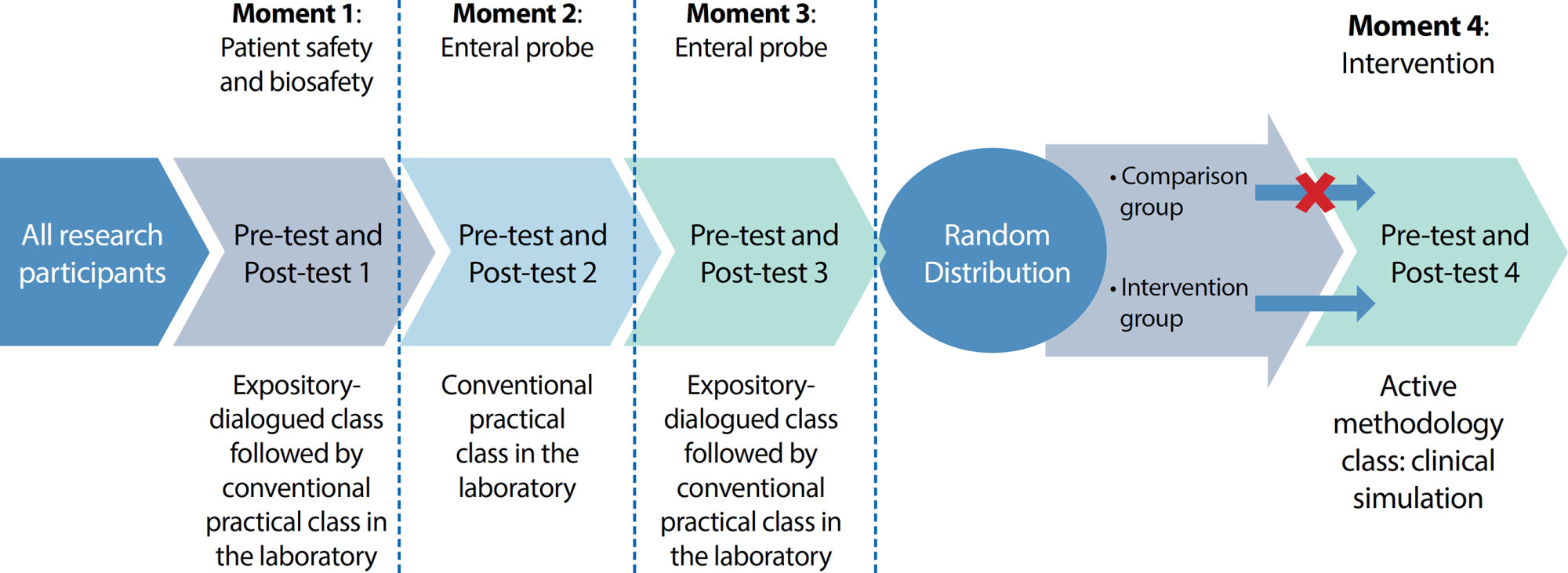
-
REFLECTION10-18-2022
The act of playing as a signifier for the application of the dramatic Therapeutic Toy performed by the nurse: theoretical reflection
Revista Brasileira de Enfermagem. 2022;75(2):e20210062
Abstract
REFLECTIONThe act of playing as a signifier for the application of the dramatic Therapeutic Toy performed by the nurse: theoretical reflection
Revista Brasileira de Enfermagem. 2022;75(2):e20210062
DOI 10.1590/0034-7167-2021-0062
Views0See moreABSTRACT
Objective:
To reflect on the possible contributions of the act of playing as a signifier in the use of dramatic Therapeutic Toy performed by the nurse.
Methods:
Theoretical-reflexive study, based on three moments: The language of the unconscious that emerges as a signifier when playing; How the dramatic Therapeutic Toy is used by the nurse; and the act of playing as a signifier during the application of the dramatic Therapeutic Toy: contributions to nursing practice.
Results:
Through the intervention of the nurse in the sessions, the act of playing mediated by the dramatic Therapeutic Toy provides the child with the opportunity to elaborate on signifier elements that had not been meant by him.
Final considerations:
Through the dramatic Therapeutic Toy, the articulation of the child’s organism with his reality in the formation of the self constitutes an advance for the production of knowledge and nursing assistance to the child, enabling complete care and allowing the elaboration of their anxieties, which collaborates so that the child constitutes himself as a subject.
-
ORIGINAL ARTICLE10-18-2022
Information and communication technologies: interfaces the nursing work process
Revista Brasileira de Enfermagem. 2022;75(2):e20201280
Abstract
ORIGINAL ARTICLEInformation and communication technologies: interfaces the nursing work process
Revista Brasileira de Enfermagem. 2022;75(2):e20201280
DOI 10.1590/0034-7167-2020-1280
Views0See moreABSTRACT
Objectives:
to unveil the meanings that nurses attribute Information and Communication Technologies for the nursing work process
Methods:
qualitative research, theoretically and methodologically based on the Complexity Theory and on the Grounded Theory, respectively. Research with 19 participants, being 12 clinical nurses, and 7 resident nurses. Semi-structured interviews were used for data collection.
Results:
the results revealed the meanings that clinical nurses attribute to Information and Communication Technologies and, thus, the motivations and limitations for the use of these technologies, pointing out possibilities and strategies that impact the nursing work process, based on the interactions promoted by the official and non-official use of these resources.
Final Considerations:
the meanings that nurses attribute to Information and Communication Technologies are dependent on their ability to successfully employ those technologies and their importance to the work process developed by the professionals.
-
REFLECTION10-18-2022
Improvement of Educational Products Validation form in professional postgraduate programs
Revista Brasileira de Enfermagem. 2022;75(2):e20210063
Abstract
REFLECTIONImprovement of Educational Products Validation form in professional postgraduate programs
Revista Brasileira de Enfermagem. 2022;75(2):e20210063
DOI 10.1590/0034-7167-2021-0063
Views0See moreABSTRACT
Educational Product and Technical-Technological Product constitute a specificity of postgraduate programs in the professional modality, a product that must be carefully evaluated by the programs and recorded on platforms of evaluating bodies. In 2019, a working group from the teaching area was assembled to create a Validation Form for these products. Thus, this article aims to present a proposal for improving this Validation Form for Educational/Technical-Technological Products, based on reflections treated in scientific articles and scientific events from the area, focusing on the relevance and need for this type of evaluation in a standardized way. It is intended to collaborate with the improvement of the evaluation processes and procedures of Educational/Technical-Technological Products for the necessary accuracy, representativeness, and homogeneity, which will allow the real dimensioning of the contributions of these products. This involves not only training qualified professionals, but also transforming practices in the Sistema Único de Saúde (SUS) [Brazil’s Unified Health System], promoting advances in science and in its fields of application.
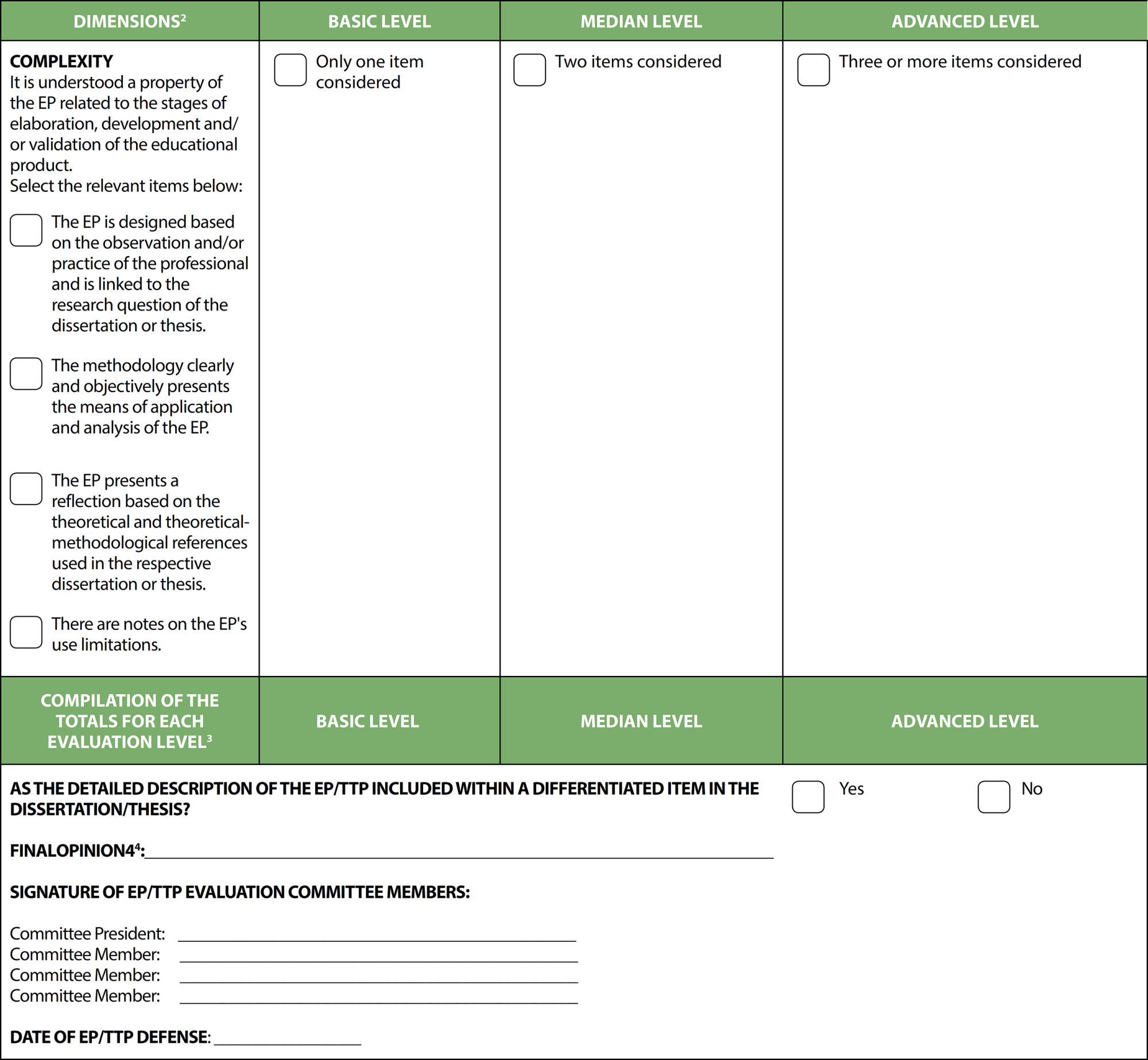
-
10-18-2022
COVID-19 and the nursing labor market: lessons learned by analogies between historical events
Revista Brasileira de Enfermagem. 2022;75(2):e20200328
Abstract
COVID-19 and the nursing labor market: lessons learned by analogies between historical events
Revista Brasileira de Enfermagem. 2022;75(2):e20200328
DOI 10.1590/0034-7167-2020-0328
Views0INTRODUCTIONThe nursing labor market in Brazil is experiencing a paradox. There is, at the same time, both a strong pent-up demand for nursing workers and a large supply of unemployed nursing workers, in addition to workers who have left their profession to work in another field(). Major financial crises, such as the one that the […]See more -
10-18-2022
Clinical progression of COVID-19 coinfection in people living with the human immunodeficiency virus: scoping review
Revista Brasileira de Enfermagem. 2022;75(2):e20201380
Abstract
Clinical progression of COVID-19 coinfection in people living with the human immunodeficiency virus: scoping review
Revista Brasileira de Enfermagem. 2022;75(2):e20201380
DOI 10.1590/0034-7167-2020-1380
Views0See moreABSTRACT
Objectives:
to map the production of scientific knowledge on the clinical progression of COVID-19 coinfection in people living with the human immunodeficiency virus (HIV).
Methods:
scoping review, with search strategies in MEDLINE, Scopus, Embase, Web of Science, and LILACS. Dual independent data extraction and analysis of the material with similarity compilation and narrative synthesis.
Results:
sample consisted of 35 articles. Fever, cough, and dyspnea were the most prevalent signs/symptoms. Recurrent complications involved desaturation/worsening of oxygen desaturation and pneumonia. No standard pharmacological treatment was identified, and the main interventions involved the provision of supplemental oxygen and mechanical ventilation. The studies recommended preventive, care, and pharmacological practices.
Conclusions:
the clinical manifestations, complications, and treatments/assistance care for people coinfected with SARS CoV-2/HIV are similar to those of the general population. Coinfection, overall, does not infer a worse prognosis.
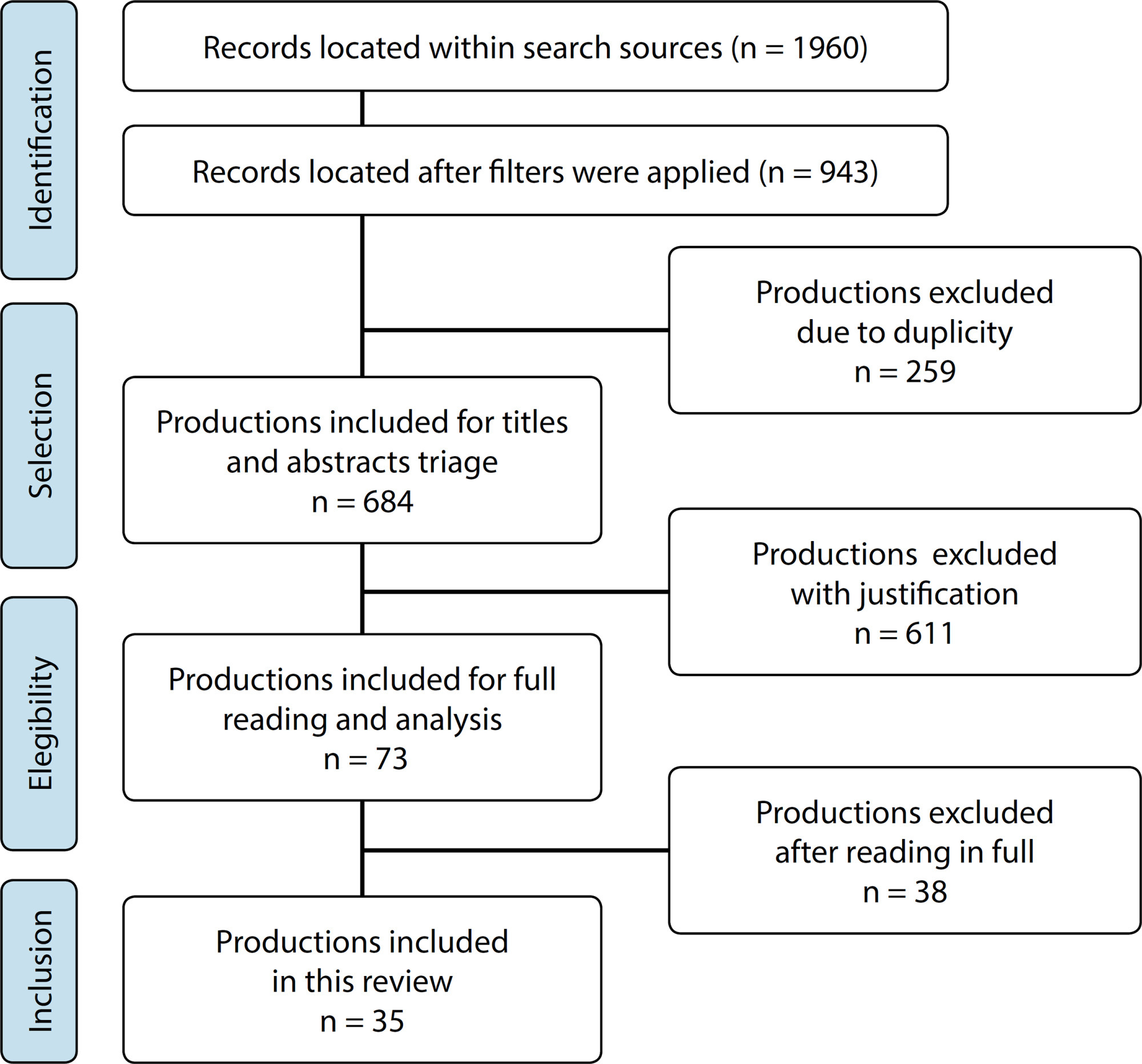
-
ORIGINAL ARTICLE09-16-2019
Validation of educational booklet: an educational technology in dengue prevention
Revista Brasileira de Enfermagem. 2019;72(5):1318-1325
Abstract
ORIGINAL ARTICLEValidation of educational booklet: an educational technology in dengue prevention
Revista Brasileira de Enfermagem. 2019;72(5):1318-1325
DOI 10.1590/0034-7167-2018-0771
Views0See moreABSTRACT
Objective:
to validate a booklet on dengue prevention in order to make it an educational technology to be used with the population.
Method:
methodological study, carried out with two groups of judges specialized in health and other areas. For data analysis, the calculation of Content Validity Index was carried out.
Results:
the booklet, in general, was considered valid by the expert judges, since it obtained an overall CVI of 70%. However, it has undergone a textual and aesthetic re-elaboration. The changes were based on the substitution of expressions, phrases, information additions and language adequacy. The illustrations were redone, adding clarity, expressiveness, movement, interaction and contextualization.
Conclusion:
the booklet is valid to be used for the population, with the purpose of informing, in a playful way, the forms of prevention and combat to mosquito transmitting dengue.

-
REVIEW09-18-2020
Mental health of healthcare professionals in China during the new coronavirus pandemic: an integrative review
Revista Brasileira de Enfermagem. 2020;73:e20200338
Abstract
REVIEWMental health of healthcare professionals in China during the new coronavirus pandemic: an integrative review
Revista Brasileira de Enfermagem. 2020;73:e20200338
DOI 10.1590/0034-7167-2020-0338
Views0See moreABSTRACT
Objective:
to identify publishing related to the mental health of health professionals working in the front line of the COVID-19 pandemic.
Methods:
an integrative review that included primary articles indexed in the Latin American and Caribbean Literature in Health Sciences, Medical Literature Analysis and Retrieval System Online, Cumulative Index to Nursing and Allied Health Literature, Scopus, Embase, Web of Science, Science Direct databases and US National Library of Medicine databases. The result analysis was performed descriptively, in four analytical categories.
Results:
The publishing involved aspects related to insufficient personal protective equipment, feelings of fear and stigma, the need for psychological and psychiatric support and the possibility of post-outbreak mental disorders.
Conclusion:
All mentioned aspects have a direct impact on the mental health of professionals, demanding the creation of strategies that minimize the emotional burnout of workers, considering that each country and culture reacts differently to the disease.

-
ORIGINAL ARTICLE06-27-2019
Religious/spiritual coping and level of hope in patients with cancer in chemotherapy
Revista Brasileira de Enfermagem. 2019;72(3):640-645
Abstract
ORIGINAL ARTICLEReligious/spiritual coping and level of hope in patients with cancer in chemotherapy
Revista Brasileira de Enfermagem. 2019;72(3):640-645
DOI 10.1590/0034-7167-2018-0358
Views0See moreABSTRACT
Aim:
To demonstrate the relationship between religious/spiritual coping and hope in cancer patients undergoing chemotherapy.
Method:
This is a cross-sectional, descriptive study with a quantitative approach performed in a reference outpatient clinic in Caruaru, PE, between August and October 2017. A total of 82 cancer patients undergoing chemotherapy were included in the study, using the brief religious/spiritual coping scale (RCOPE-Brief) and the Herth Hope Scale (HHS).
Results:
The sample presented mean positive RCOPE scores (3.03 ± 0.41) and the level of hope was considered high (42.7 points ± 3.67). Patients who had a high RCOPE score were found to have a higher mean of Herth’s level of hope (44.12 points).
Conclusion:
This study becomes relevant to nursing professionals by encouraging care that takes into account the patient’s spiritual dimension in order to stimulate positive mechanisms of religious coping and, consequently, raise the levels of hope.
-
ORIGINAL ARTICLE04-22-2020
Construction and validation of an educational booklet on care for children with gastrostomy
Revista Brasileira de Enfermagem. 2020;73(3):e20190108
Abstract
ORIGINAL ARTICLEConstruction and validation of an educational booklet on care for children with gastrostomy
Revista Brasileira de Enfermagem. 2020;73(3):e20190108
DOI 10.1590/0034-7167-2019-0108
Views0See moreABSTRACT
Objectives:
to describe the process of construction and validation of an educational booklet on care for children with gastrostomy, directed to caregivers.
Methods:
a methodological study developed in five stages: bibliographic survey; situational diagnosis; illustration, layout, design and text construction; expert validation and Flesch-Kincaid Readability calculation; validation with the target audience. Content Validity Index and Suitability Assessment of Materials were applied for expert analysis.
Results:
the Content Validity Index obtained overall score of 0.93. In the Suitability Assessment of Materials score, the booklet scored 85.2%. It presented a satisfactory readability percentage, with an overall score of 72%, and was consistent with caregivers’ assessment in the validation with the target audience, considering the explanatory technology, important and adequate.
Conclusions:
the developed educational booklet was considered valid for use by caregivers, thus contributing to the maintenance of best practices in care for children with gastrostomy.
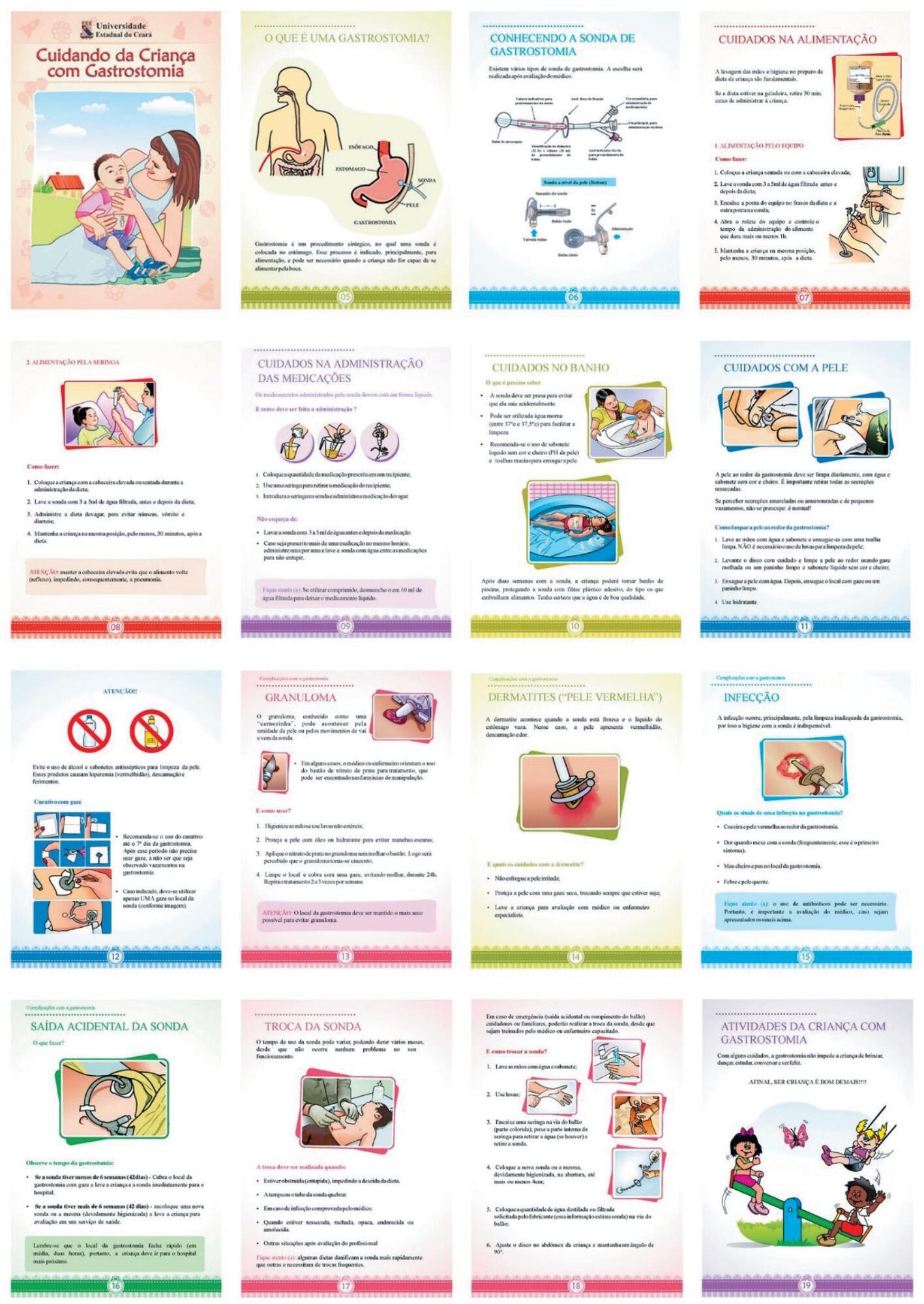
-
REVIEW12-05-2019
Hospital transition care for the elderly: an integrative review
Revista Brasileira de Enfermagem. 2019;72:294-301
Abstract
REVIEWHospital transition care for the elderly: an integrative review
Revista Brasileira de Enfermagem. 2019;72:294-301
DOI 10.1590/0034-7167-2018-0286
Views0See moreABSTRACT
Objective:
to identify evidence of scientific production on hospital transition care provided to the elderly.
Method:
an integrative review, with publications search in the MEDLINE, PubMed, LILACS, BDENF, Index Psychology and SciELO databases, with keywords and Mesh terms: elderly, hospitalization, patient discharge, health of the elderly, and transitional care, between 2013 and 2017 in English, Portuguese and Spanish. The 14 selected articles analysis was carried out through exploratory and critical reading of titles, abstracts and results of the researches.
Results:
transitional care can prevent re-hospitalizations as they enable rehabilitation, promotion and cure of illnesses in the elderly.
Final considerations:
transitional care implies the improvement of the quality of life of the elderly person, requiring skilled health professionals who involve the family through accessible communication.

-
REVIEW08-07-2020
Positive aspects of authentic leadership in nursing work: integrative review
Revista Brasileira de Enfermagem. 2020;73(6):e20190118
Abstract
REVIEWPositive aspects of authentic leadership in nursing work: integrative review
Revista Brasileira de Enfermagem. 2020;73(6):e20190118
DOI 10.1590/0034-7167-2019-0118
Views0See moreABSTRACT
Objective:
To identify and analyze the existing scientific production on the positive aspects of authentic leadership in the nurse’s work process.
Method:
This is an integrative literature review. The databases used were Scientific Electronic Library Online; Latin American and Caribbean Literature on Health Sciences; and National Library of Medicine – National Institutes of Health.
Results:
In this study, 17 articles were selected for analysis; 1 study (6%) was published in a national journal, and 16 (94%) were international studies. Of the 17 (100%) articles studied, 11 (65%) were developed in Canada. The hospital environment was present in the 17 (100%) articles.
Final considerations:
Authentic leadership has several positive aspects that significantly influence the nurse’s work process, such as engagement and job satisfaction, retention of new nurses, organizational commitment, among others.
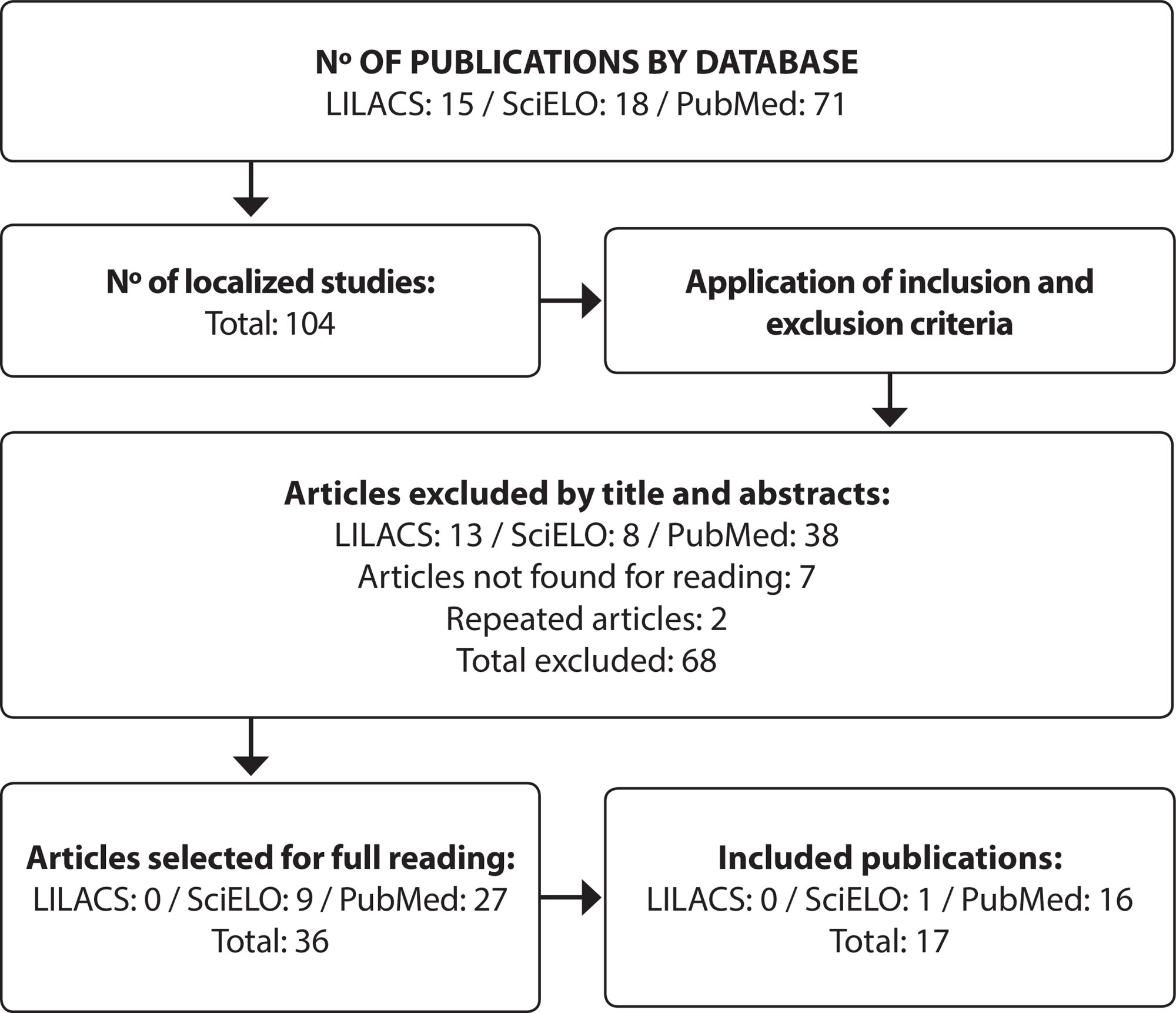
-
ORIGINAL ARTICLE12-21-2020
Development of an appearance validity instrument for educational technology in health
Revista Brasileira de Enfermagem. 2020;73:e20190559
Abstract
ORIGINAL ARTICLEDevelopment of an appearance validity instrument for educational technology in health
Revista Brasileira de Enfermagem. 2020;73:e20190559
DOI 10.1590/0034-7167-2019-0559
Views1See moreABSTRACT
Objectives:
to develop and evaluate the convergence of the instrument for the appearance validity of educational technologies in health.
Methods:
methodological study conducted in two steps. In step 1, the instrument items were developed, with subsequent content validity by nine specialists in the development of educational technologies in health. In step 2, the convergent validity between another instrument and the appearance instrument was performed. Correlation results above r> 0.3 and p <0.05 were considered as plausible convergent validity.
Results:
the ten items of the initial version of the appearance instrument were submitted to content validity that resulted in a final version with 12 items (Content Validity Index = 0.93). The correlation indexes were strong with the objective and appearance domains; moderate with motivation, organization and total; and weak with writing style.
Conclusions:
the appearance instrument demonstrated content validity and convergent validity, in addition to a strong correlation with the other instrument.
-
ORIGINAL ARTICLE02-10-2020
Burnout among nursing students: predictors and association with empathy and self-efficacy
Revista Brasileira de Enfermagem. 2020;73(1):e20180280
Abstract
ORIGINAL ARTICLEBurnout among nursing students: predictors and association with empathy and self-efficacy
Revista Brasileira de Enfermagem. 2020;73(1):e20180280
DOI 10.1590/0034-7167-2018-0280
Views0See moreABSTRACT
Objective:
to analyze burnout, its predictors and association with empathy and self-efficacy among nursing students.
Method:
cross-sectional analytical study with 284 students from five state universities in the state of Parana, Brazil. The instruments applied were: social and academic questionnaire, Maslach Burnout Inventory, Interpersonal Reactivity Index and Occupational Self-Efficacy Scale (Short Form). Spearman’s correlation and univariate and multivariate logistic analysis were used.
Results:
6.0% of the students presented high burnout, 36.3% presented high emotional exhaustion, 37.7% presented high depersonalization and 28.2% presented low personal accomplishment. The burnout predictors were: absence of physical activity; weekly workload >24 hours; low empathic concern. There were negative correlations between empathy (empathic concern and perspective taking) and depersonalization; self-efficacy and emotional exhaustion; and positive correlations between personal accomplishment and empathy and self-efficacy.
Conclusion:
Personal factors and an academic variable were burnout predictors among nursing students. The correlations suggest that self-efficacy and empathy can prevent burnout.
Search
Search in:
Nuvem de Tags
Adolescente (85) Atenção Primária à Saúde (239) COVID-19 (91) Criança (91) Cuidados de Enfermagem (269) Educação em Enfermagem (151) Educação em Saúde (139) Enfermagem (930) Enfermagem Pediátrica (86) Estudantes de Enfermagem (77) Estudos de Validação (131) Família (87) Idoso (208) Promoção da Saúde (99) Qualidade de Vida (104) Saúde do Trabalhador (86) Saúde Mental (145) Saúde Pública (82) Segurança do Paciente (150) Tecnologia Educacional (100)



